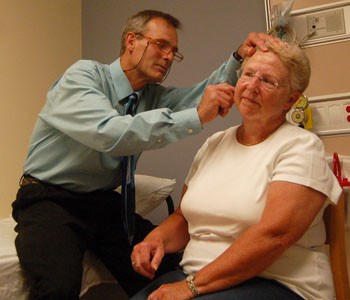Tanning beds and over exposure to sunlight has increased the rate of skin cancer, says a dermatologist at the regional hospital.
The Canadian Cancer Society offered skin cancer screening and a presentation at the Thunder Bay Regional Health Sciences Centre Fracture Clinic on Saturday. The Cancer Society held the screening and presentations an effort to bring further awareness about skin cancer. Traditionally, individuals with fair skin, work outdoors and have many freckles or moles are at a higher risk for developing skin cancer.
Dr. Ron Mahler, a dermatologist with the Thunder Bay Regional Health Sciences Centre, said the biggest problem with skin cancer is its becoming more common.
"It is something that is becoming more and more of an issue," Mahler said. "I think the theory that is most accepted is we’re a generation that is very different. We have more leisure time, spend more time outdoors and we tend to have far more sunburns than our grandparents ever did."
Traditionally, girls use tanning beds more often than boys to help give them a summer tan. Mahler said it concerns him greatly that girls go to tanning beds. He added there is evidence to support a link between tanning beds and an increase in skin cancer.
"There is no reasonable excuse to go to an artificial tanning centre," he said. "It is becoming a huge industry and the problem is it’s really targeting the young adult females. They are the largest group who use artificial tanning."
Mahler said one in five people develop skin cancer at some point in their lives. While most skin cancers are treatable, the most dangerous skin cancer, melanoma, is becoming more common, especially with young girls, he said.
Melanoma begins as a coloured mole or spot but spreads quickly to the surrounding skin and other organs. According to Health Canada, melanoma makes up only six per cent of all skin cancers but most often leads to fatalities.
Mahler said people should watch for the ABCD’s: asymmetry, borders, colours and diameter. He said that like anything else, moderation helps in decreasing the chances of skin cancer.
"There isn’t a dermatologist around that will tell you once summer comes around to head to the basement," he said. "We all enjoy the summer and outdoor activities. We try to wear clothes when we can and try to avoid excessive sun exposure when you can."
Sign in or register
- Messages
- Post a Listing
- Your Listings
- Your Profile
- Your Subscriptions
- Your Likes
- Your Business
- Support Local News
- Payment History
Registered Users
Already have an account?
New Users
Create a free account.
